Women Making an Impact Through Science and Tech, From the Local to the Global
A new model of women-led entrepreneurship is emerging throughout the Asia Pacific
Our world is confronted by extraordinary challenges–from carbon emissions to aging populations, food instability and access to rural healthcare. It is easy to worry that the pace of new solutions cannot keep up with these challenges. And yet, a new generation of innovators from a rising part of the world is proving that perspective absolutely wrong. Women science and tech entrepreneurs throughout the Asia Pacific region are creating products that are both commercially viable and lead to meaningful change in their communities. They are proving these qualities are not mutually exclusive and that each can empower the other. Throughout these emerging economies, women, whose stories and backgrounds are as unique and diverse as their solutions, are at the forefront of a new wave of innovation.
While economic prosperity is critical to post-pandemic life, there is a desire to go one step beyond and ensure an equitable and sustainable model is part of the future. This paradigm shift has given new life to ventures who are on the front lines of issues such as climate change mitigation. To empower small businesses in the coming energy transition, Melissa Chavana from Mexico developed a software, sinCarbono, that helps guide small businesses through the process. Her startup’s solution simplifies calculating the carbon footprint of SMEs through measuring, reporting, verifying, offsetting, and financing eco-technologies. It’s a platform that generates a sharable digital report that monitors reduction targets and gives the opportunity to offset emissions through a forest conservation project in Mexico. She is building a system that leverages the unique position of small businesses to act as a catalyst for local, regional, and intrinsically global change. As more countries sign pledges to reduce their carbon emissions, Melissa Chavana is showing them how.
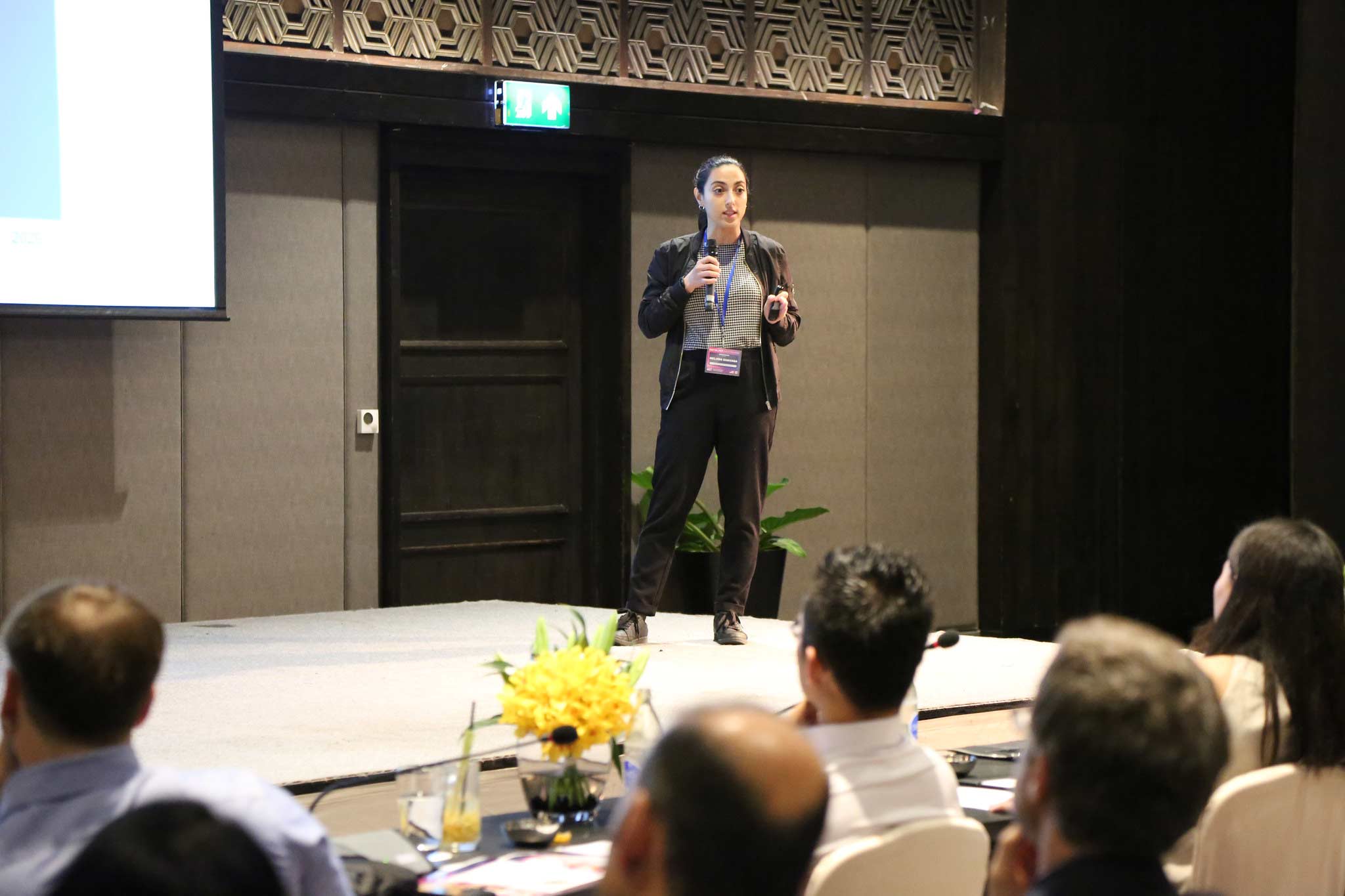
Melissa Chavana, the innovator behind the venture sinCarbono, pitches in front of an audience at the CATALYST Pitch Competition in Bangkok.
Celebrating and supporting innovations like these is the cornerstone of GIST CATALYST, a pitch competition under the Global Innovation through Science and Technology (GIST) Initiative, which was created by the U.S. State Department’s Bureau of Oceans and International Environmental and Scientific Affairs. For her work, Melissa was awarded $20k at this year’s GIST CATALYST Asia Pacific pitch competition in Bangkok, Thailand. And she wasn’t alone. The top startups took home $70k in funding and will receive 6 months of mentorship from U.S. industry experts.
Being on the frontlines of a changing climate, innovator Nadea Nabilla, a young electrical engineer from Indonesia, saw fishermen in her home of Bali struggling with costly and environmentally destructive motor boats. Dependent on the boats’ gas-powered engines that are both unreliable and use fossil fuel, Nadea vowed to find a better way for them to make their living. In 2020 she founded Azura Indonesia, and began prototyping her MantaOne electric propulsion system. Unlike its combustion engine cousin, the MantaOne reduces costs and carbon footprints, making it a win-win for fishermen. She just had to convince local fishermen to use the motor. Using her background in electrical engineering, her startup created a prototype and began initial trials with a few skeptical fishermen. The motor proved to be a technological home run, charging quickly and running nearly all day long. To make it affordable required even more innovation, calling upon her business skills and passion for social equity. Nadea offered the motor on a staggered payment plan over 4 years after which the fishermen would own the motor outright, providing a pathway for economic agency and empowerment for coastal communities. Technology combined with a social vision and pioneering business plan ultimately prevailed in building a structure for resilient and sustainable industries for the coming decades. Nadea’s innovative technology and business plan earned her $8k from the GIST CATALYST: Asia-Pacific Pitch Competition.
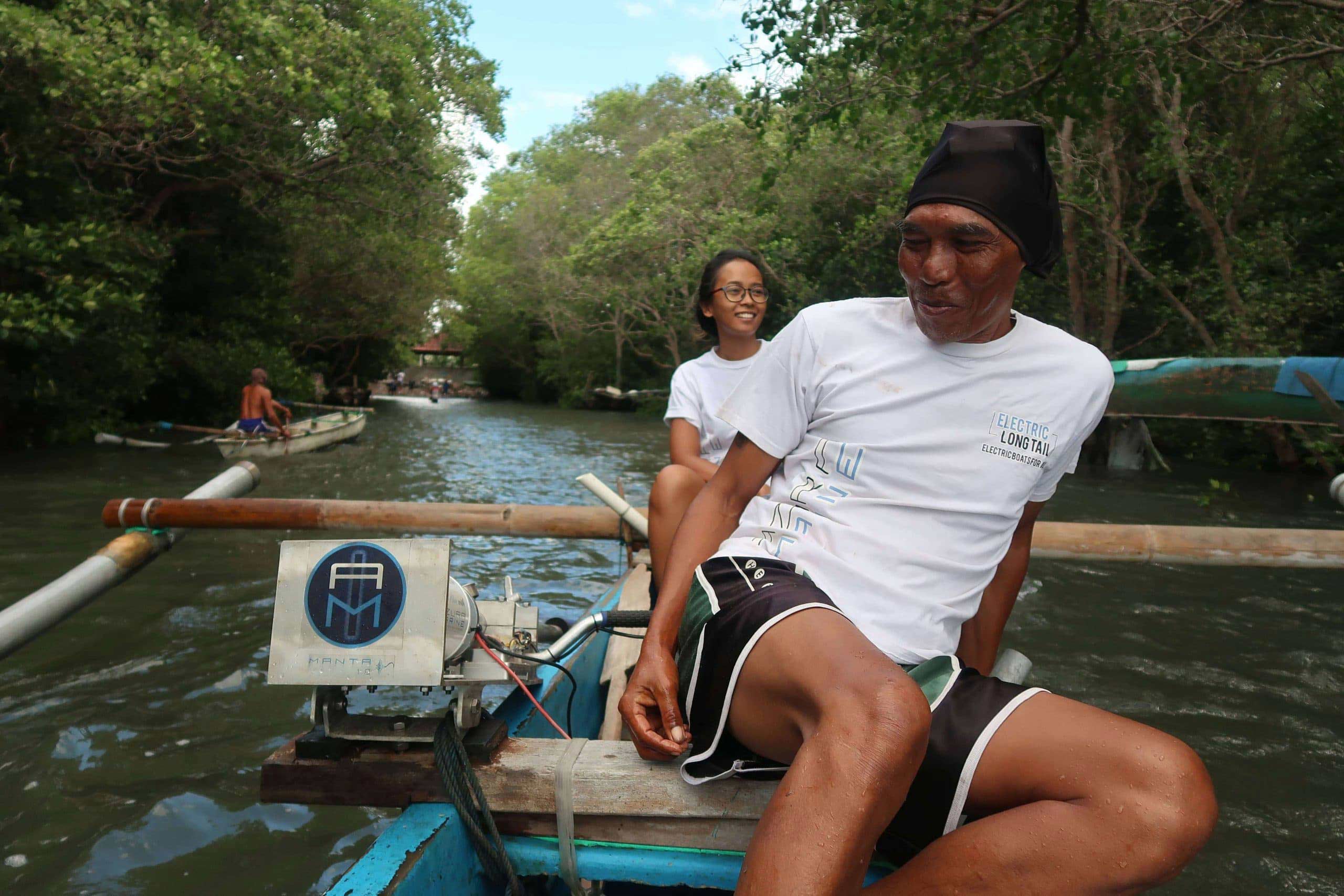
Innovator Nadea Nabilla rides on a small craft powered by the MantaOne propulsion system her company developed. A local Indonesian fisherman volunteering his craft for the demonstration is visibly impressed by the small electric motor.
GIST has a history of elevating innovators who show a strong desire to protect the environment and create a more sustainable economy. This combination is vital to the emerging “new normal” that many APEC countries are actively working to create. GIST is able to provide not only financial support, but deep global venture development assistance and resources through its unique role as a U.S. State Department program.
It is in this unique role as a bridge between pioneering private industry, deep academic know-how, and the values of U.S. leadership that the GIST Initiative is able to elevate and support these innovators at the frontlines of so many global challenges. These entrepreneurs are not only the most in need of support and investment, but are often the most capable of meeting the challenges happening right at their front door.
Global food insecurity is a challenge that indiscriminately affects all ages, genders, and classes. As the world’s population increases, so must our ability to adequately feed it without overburdening the ecological systems that support myriad life on the planet. As South America’s forests are increasingly being transitioned to cattle farming, Pamela Barroso’s Luyef Technologies sees an opportunity to reduce our dependence on animal protein in favor of meat alternatives. The trick is creating a product that people want to eat instead of traditional meat. To do this, Pamela’s team has worked to perfect the flavor that makes meat alternatives viable. Her passion is a personal one. She became a vegan after seeing the harsh conditions and environmental impact of cattle grazing in her home country of Peru. As a scientist she leveraged her knowledge to create a product that would meet both her goals of an environmentally sound and cruelty-free food source. Her efforts are already paying off with looming partnerships and sales–as well as taking 5th place at the GIST CATALYST Asia Pacific Pitch Competition.
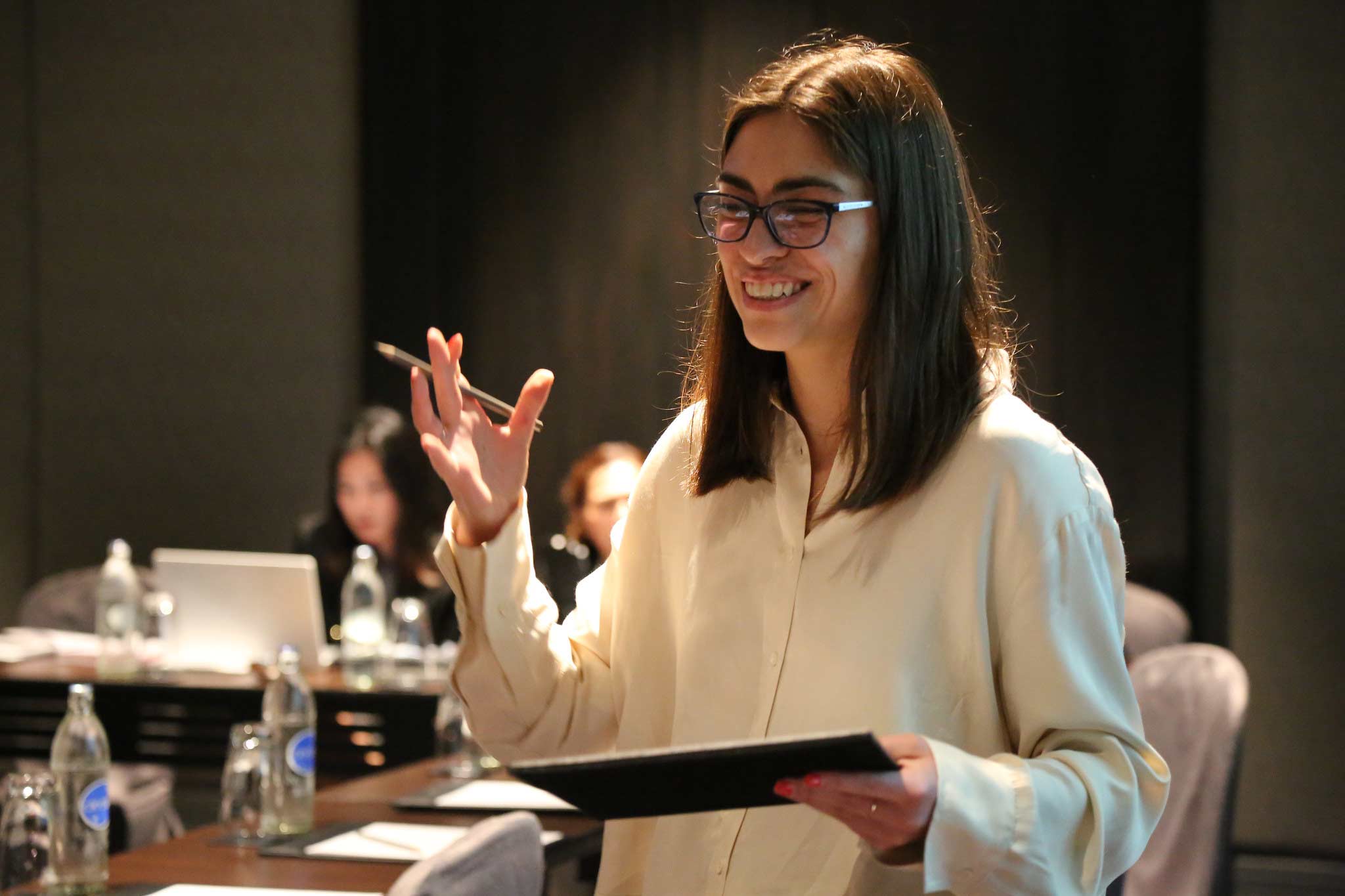
Pamela Barroso of Luyef Biotechnology takes part in GIST trainings designed to build venture development strategies.
GIST innovators often come to entrepreneurship for personal reasons. In the case of Vietnamese founder Trang Pham Thi Nhu, it was her co-founder’s aunt who was the catalyst for their venture’s mission. Continually misdiagnosed, the aunt’s Alzheimer’s disease went unchecked until it was finally properly discovered. But by then the aunt had been in and out of psychiatric hospitals, her life turned upside down. It was a tragic way to find inspiration, but the result was a new, early detection model for Alzheimer’s, a disease that affects over 50 million people worldwide. Using machine learning and deep neural networks capabilities, Trang’s startup, Brain Analytics, has the goal of detecting Alzheimer’s early and accurately. For her compelling and unique solution, she was awarded 3rd place and $10k in startup funding.
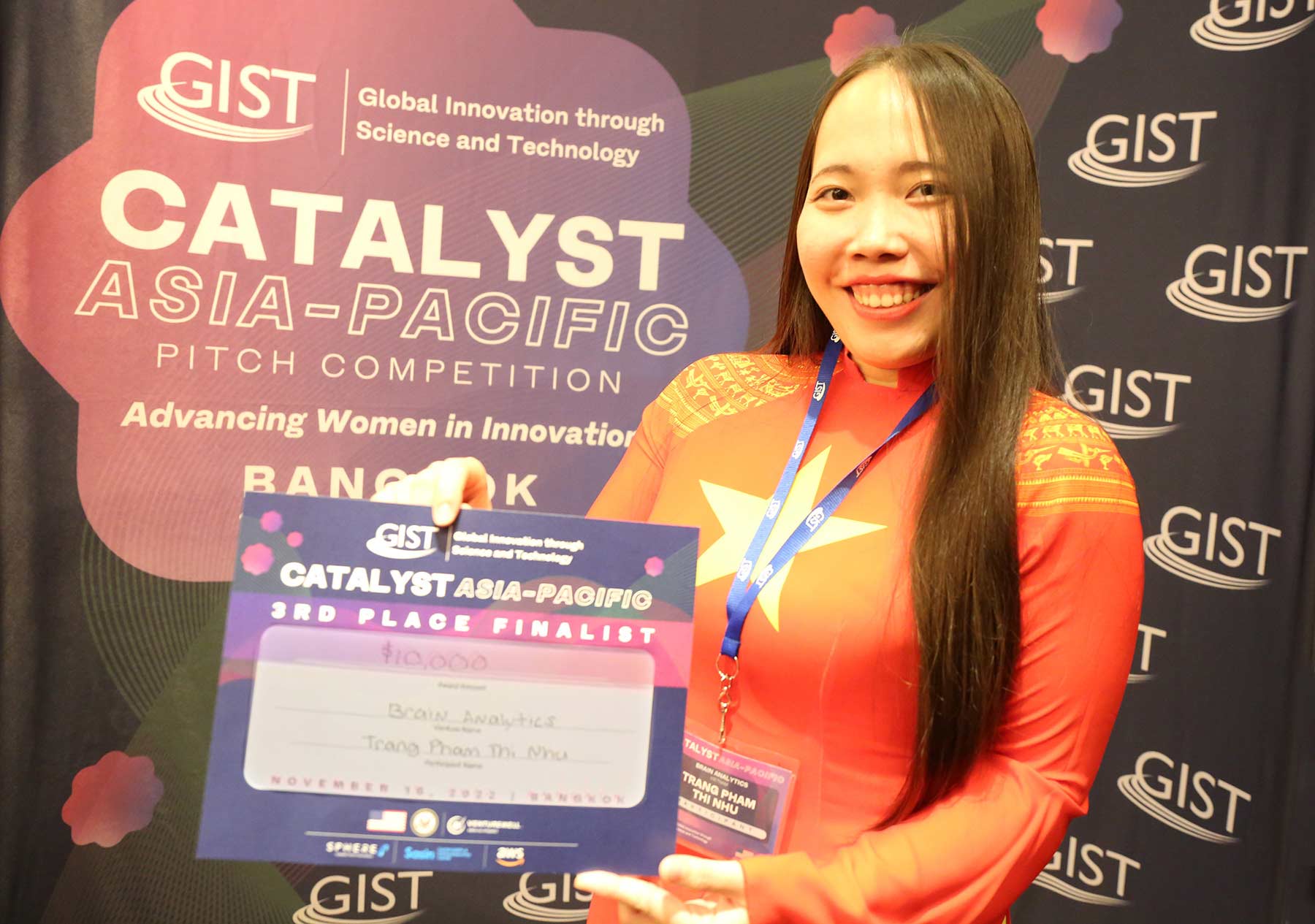
Innovator Trang Pham Thi Nu is pictured with her 3rd place Finalist Award for her role in innovating early Alzheimer's disease detection.
Given the vastness of the climate crisis it is not surprising that another GIST innovator found their way into the field of carbon capture. It is one of the biggest challenges we face as a global community but also has tremendous promise. How can we reduce our carbon footprint while mitigating and correcting the damage already done? Scientists around the globe are working to solve this incredibly complex problem, and Dr. Choe Peng Leo is one of them. Galvanized by the birth of her son and the experience of motherhood, she began working tirelessly to help build a better future for him and his entire generation. The Malaysian scientist’s efforts led her to develop ThinKers, her company and platform for carbon capture technologies. The venture’s journey generated not just one solution from their efforts but three. Their initial development of a capture film element resulted in discoveries that now help treat waste water and generate soil fertilizer, making the ultimate array of products all the more effective. For her incredible insights and impact, Dr. Choe was the 1st place winner and recipient of $25k to work towards further commercializing her innovation.
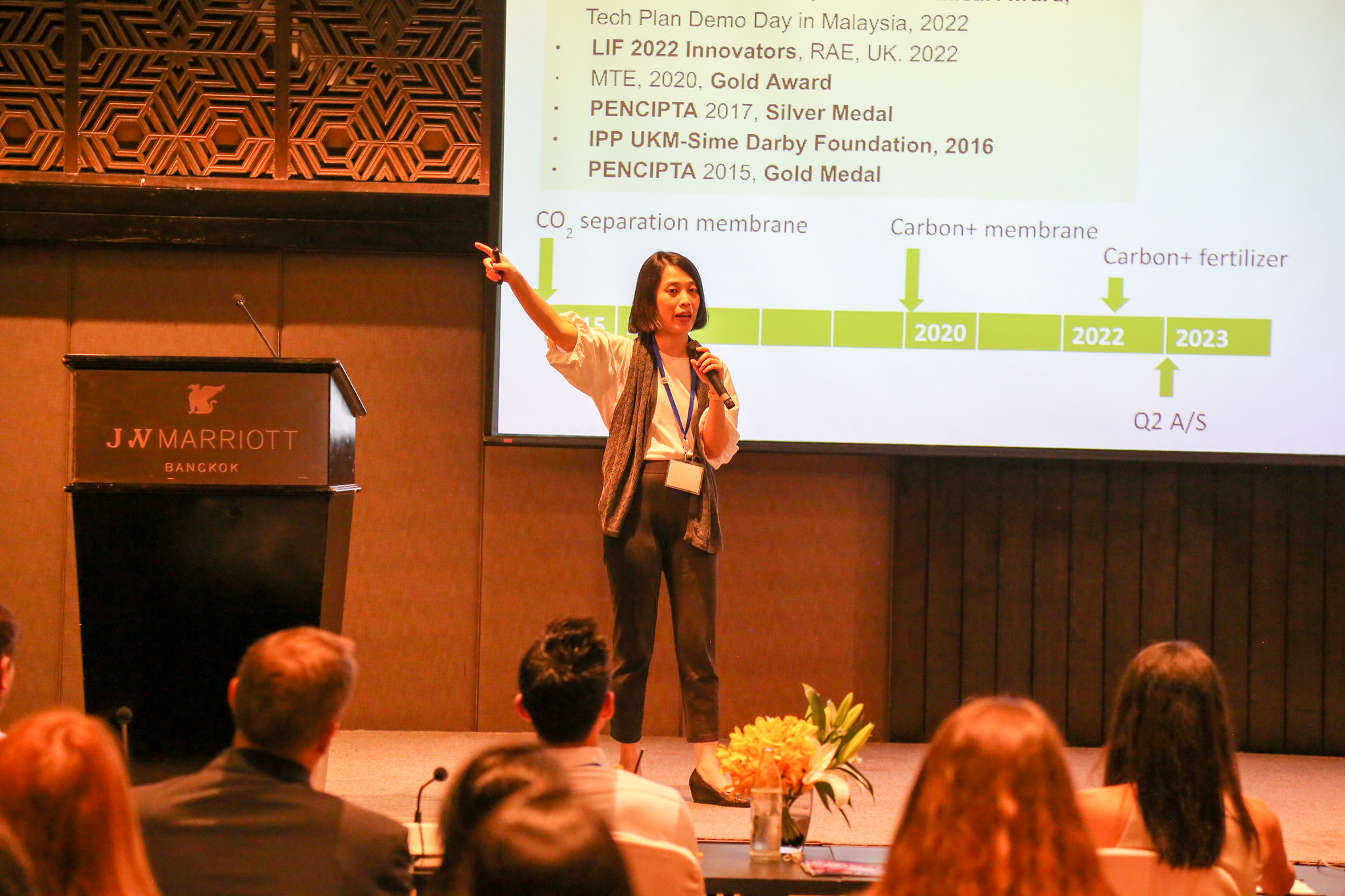
Dr. Choe Peng Leo presents her innovation on unique thin film solutions for carbon capture, an advancement that would win her the first place prize.
These innovations are arriving at a paramount time for the global innovation community, as we build a more sustainable and equitable future. Science and technology can help us get there- but it is the people behind these innovations that truly matter. Programs like GIST CATALYST can help directly empower visionaries. Women innovators in particular play a key role in meeting these challenges head on, and it is a key part of the GIST Initiative’s mission to uplift them. Women innovators account for just twenty percent of the viable startups in the world but generate more revenue than their male counterparts–and yet, they are deeply underrepresented in the world of science and technology. Removing the barriers to entrepreneurship is critical to addressing this inequality.
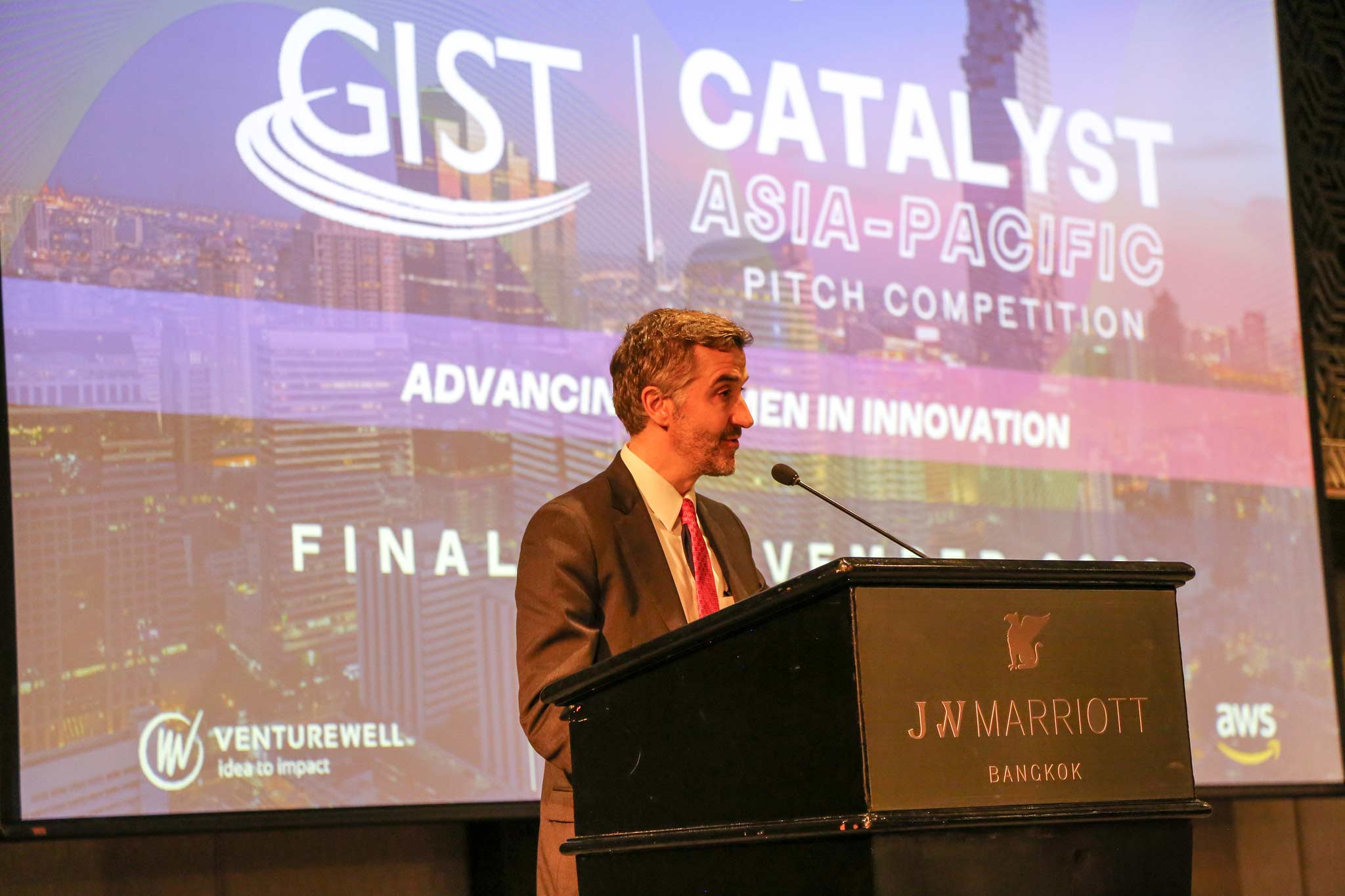
Assistant Secretary Ramin Touloui shares remarks highlighting the essential role of women innovators in building the solutions of tomorrow.
In his remarks at the pitch competition, Assistant Secretary for the U.S. State Department’s Bureau of Economic and Business Affairs, Ramin Toloui, explained the importance of events such as CATALYST in working to solve this challenge, proclaiming that, “This event underscores how we need to look in places which are underrepresented if we want to find and tap into the solutions to the problems of the future. And women are underrepresented in our economies as a whole, they are underrepresented in science and technology fields, and they are underrepresented in venture capital. One important purpose of this event, which the U.S. government is very proud to be a sponsor of and be associated with, is to provide a platform to elevate the innovative work the women of the Asia Pacific APEC region are doing… We are committed in the State Department and the U.S. government to provide opportunities to shine a spotlight on innovation. That’s important not only for achieving the very important goal of inclusivity but it's also important to provide solutions to the critical problems facing the world.”
Let's Build a Better, More Equal Innovation Future.
The GIST Initiative is a proud partner in working towards fulfilling this mission. You can learn more about the work of the GIST Initiative in directly empowering innovators to solve global challenges, from gender equity to ocean sustainability, in regions all throughout the world, at the GIST website. Together, we can build a better global innovation future!